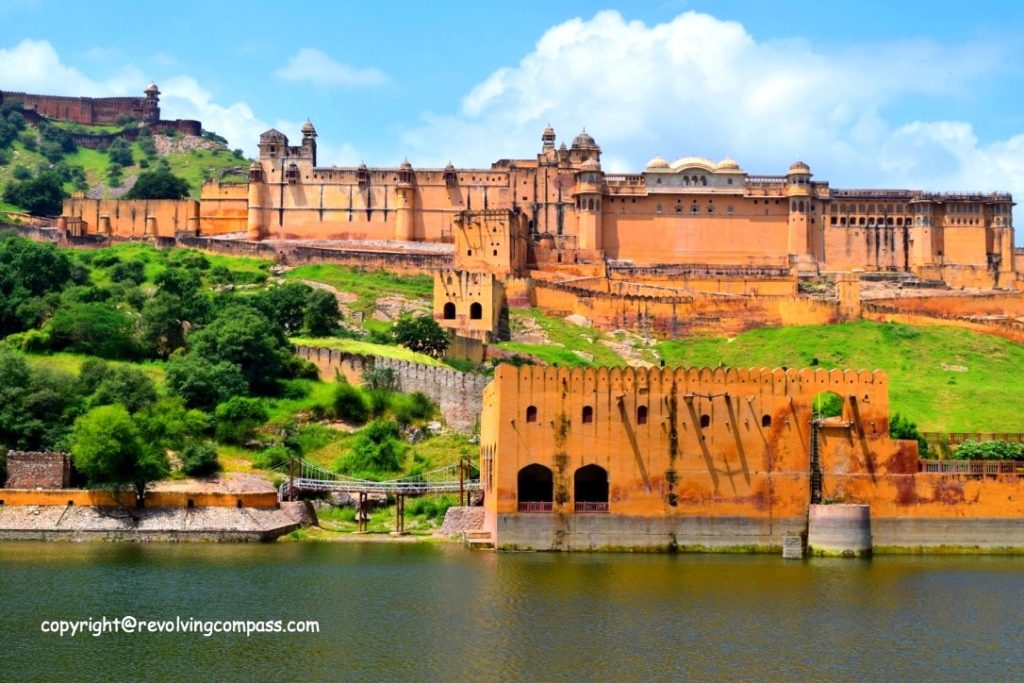
As we start planning our Jaipur trip in 2016, we start reading about the places to visit. Seems like Amer fort is one name that surfaces on the top everywhere indisputably. The more we read about it, the more excited we feel to visit here. So, we planned to visit here on our very first day in Jaipur during our recent Rajasthan trip.
Off to Amer
Amer or Amber is a tiny, 4 square kilometer town located near Jaipur. Currently it is under the Jaipur Municipal Corporation. However, way back in the past, it was one of the flourishing , glorious empires of India (As is evident from the mighty fort). More on Amer here. We started from our home around 10 in the morning and reached Amer fort after around an hour’s drive. While on the last stretch of the drive, as we turned towards the Aravali ranges, we caught the first glimpse of the vast stretch of Amer fort behind the majestic walls that ensured the protection of the fort.
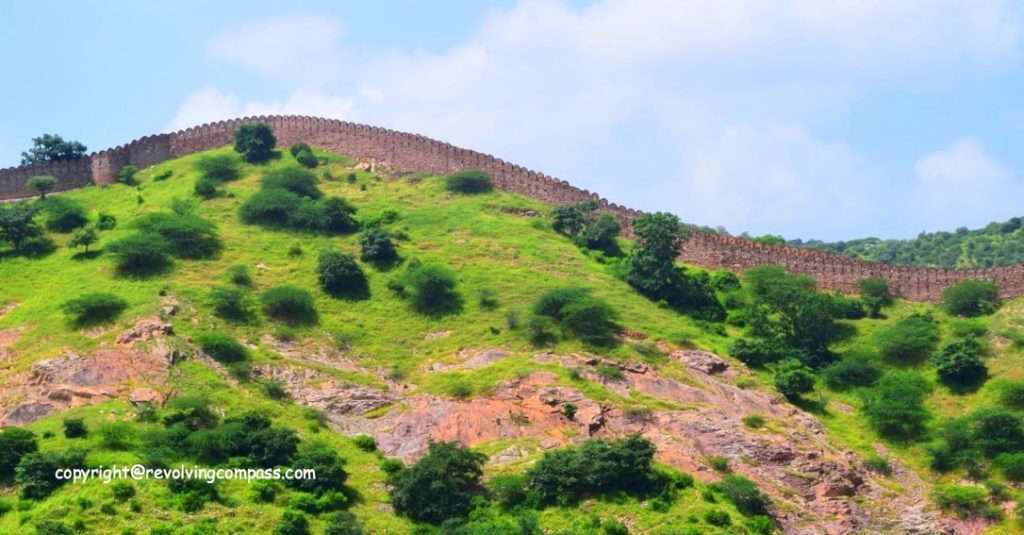
Near here, we took the services of a guide. (Its good to take a guided tour instead of traveling independently when visiting such historical places. They are the experts on the historical significance of the places we see inside the forts and palaces). The guide took us through some narrow lanes towards the main entrance of the fort, in order to avoid traffic. Upon arrival, we left our vehicle just near the parking lot in front of the main entrance. Then, we walked a little on the cobblestoned slant pathway to reach the entrance gate. Near the gate, a local was playing beautiful chords of a melodious song..I was stuck-bound for a few moments, admiring his talent.
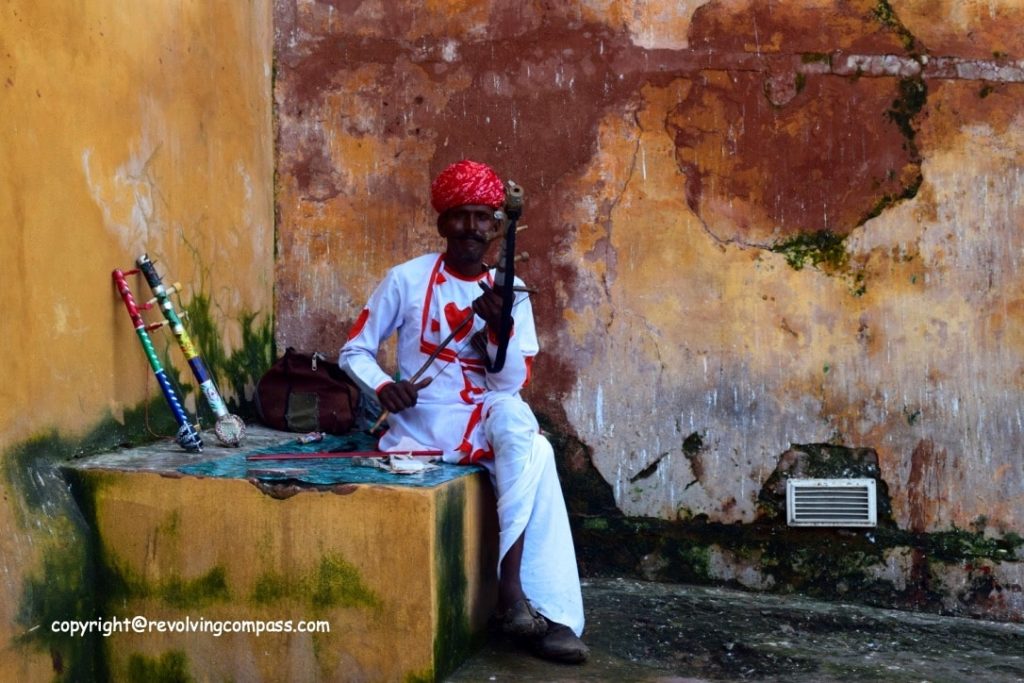
While we waited near the ticket counter, our guide went ahead to collect our tickets. Subsequently began our journey of the Amer fort, through the main entrance, Suraj Pole.
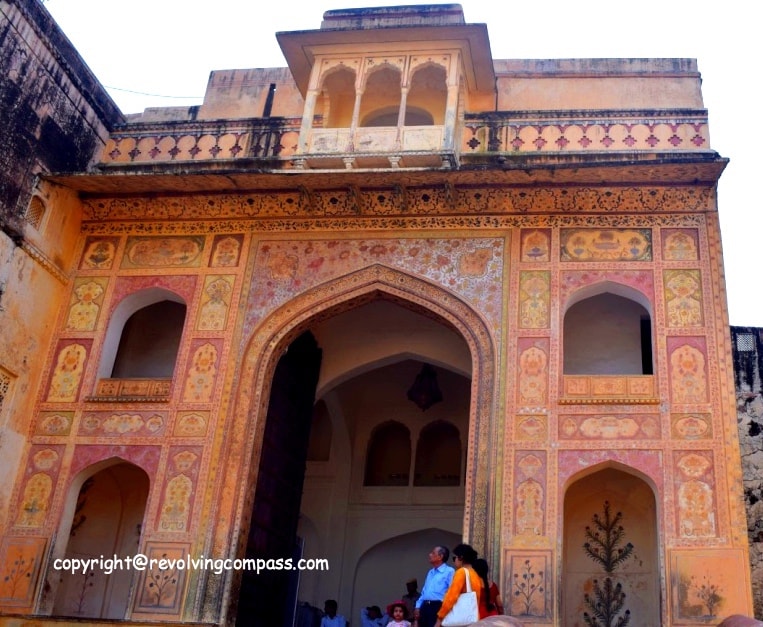
Our guide insisted that before starting the trip, we delve a little into the history of the fort and the dynasty that ruled Amer. So, here goes an excerpt of what we heard from him:
History of Amer Fort
The Amber town was developed by the Meenas (A tribal community that resided in areas of Rajasthan and Madhya Pradesh). Later, Raja Man Singh I ruled it from December 21, 1550 – July 6, 1614 . Raja Man Singh I was one of the navratans from the court of Mughal Emperor Akbar. The fort underwent lots of improvements and restructuring during the reigns of Raja Man Singh I and his descendants.
Our Journey through Amer Fort via:
1) Suraj Pol & Ganesh Pol
Suraj Pol or “Sun Gate” is the entrance that faces towards the east. As a result, rays of rising sun enter the palace from here. Overall Amer fort has 4 major entrances, including Suraj Pol. We entered the fort through this gate. There are 3 other gates, including the main gate, Ganesh Pol. Ganesh is the Hindu God symbolizing wisdom and marking auspicious starts. Ganesh idols are often put at the main entrance to homes. The King, along with his royal forces, entered the palace from this gate, when they returned from a battle, celebrating their victory. You will see a small window over the Pol. Through this window, the royal ladies witnessed the troop arrival. Since, as per the custom, Royal ladies didn’t appear publicly.
Ganesh Pol is adorned with beautiful carvings and paintings done in natural color (Painting in natural color is the root essence of all authentic Rajasthani paintings. The paint colors are extracted from flowers, vegetables, spices and stones, or, they are made out of reaction of natural acidic and alkaline mediums amongst each other)
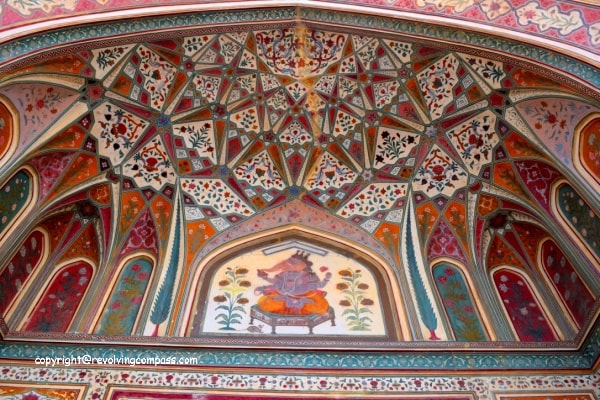
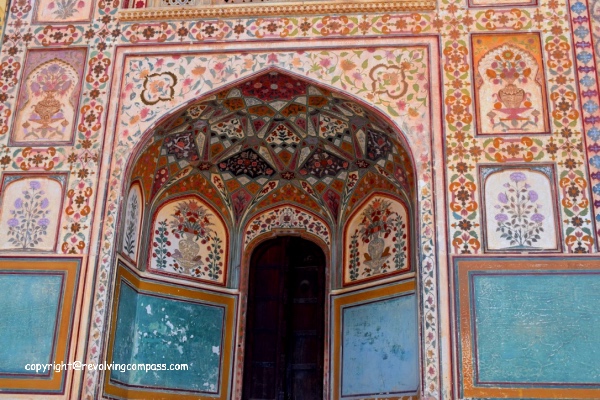
2) Jaleb Chowk
Upon crossing the entrance gate, we entered into a huge courtyard. This is Jaleb Chowk (An arabic phrase which means assembly place for soldiers). This courtyard was built by Sawai Jai Singh. The royal military force and the king’s bodyguards used this courtyard as their parade ground. The vast stretch of the courtyard is a symbol of the might of the fort and the empire that once upon a time thrived here. Furthermore , one side of the courtyard is lined by the horse stables.
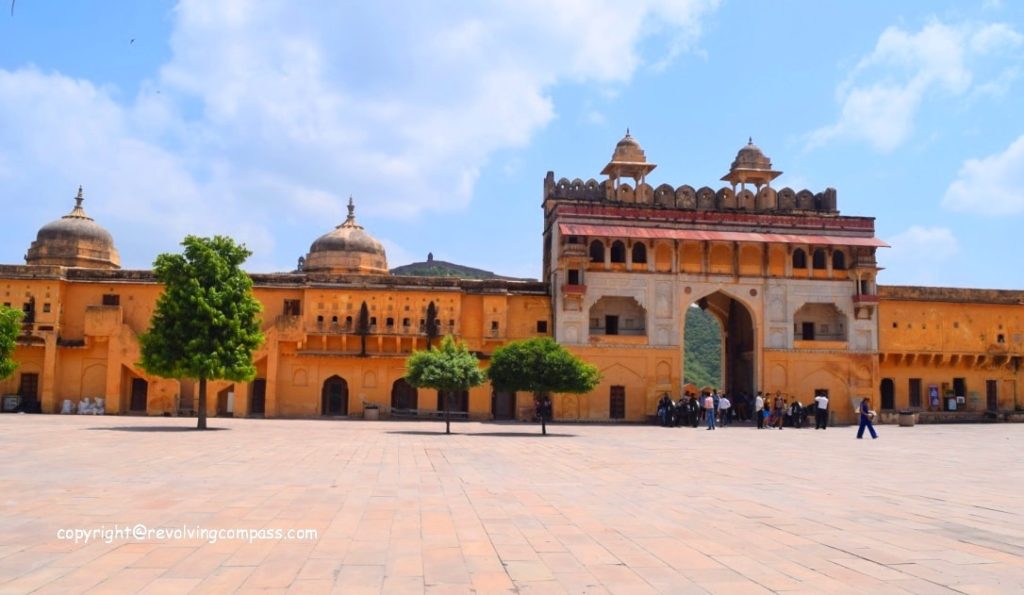
3) Sila Devi Temple
From Jaleb Chowk, we took a flight of stairs, to reach the entrance of Sila Devi Temple. Unfortunately, it was past 12pm, so, the temple doors were closed. (Temples are closed from 12pm-4pm). The temple door is made of Silver with beautiful and intrinsic carvings on the door. As per the story narrated by our guide, the King used to offer his prayers at this temple before heading our on battles or any other important business rendezvous. This temple witnessed one human sacrifice every day (gruesome!!) in order to please the deity . As per the guide, till date, the custom continues, only that a goat sacrificed at this temple every day, instead of a human (I so wish it also stops!)
4)Diwan-i-Am
From near the temple gate, following an entry way we entered into the next courtyard. In the center of this courtyard was Diwan-i-am or the common assembly place. It is a raised platform in the center of the courtyard. It was an assembly place for the kind to meet the people of his kingdom here and listen to their problems. This was basically the place to hear the voice of the public.
5) Sukh Niwas
From Diwan-i-Am, through Ganesh Pol, we entered into the area of the palace that contained the private quarters of the king and his acquaintances. This was the third courtyard, with buildings on either side and a mughal style garden in the center of the courtyard. The buildings on one side were the quarters in which the king, queen and their relatives resided. This portion is called Sukh Niwas (Happy residence). The one on the other side was the infamous Sheesh Mahal. The garden in between had water fountains and underlying pipelines that constantly circulated the water to create a natural cooling effect inside the Sukh Niwas.
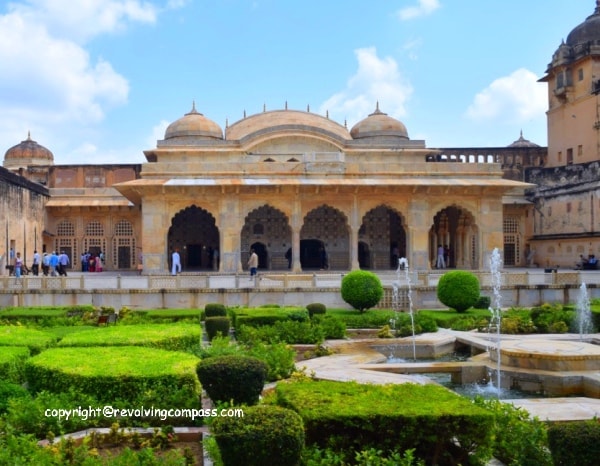
6) Sheesh Mahal
Walking across the courtyard , admiring the lush green and beautifully maintained garden, we arrived at the private quarters. The quarters are closed to the public. One can get a glimpse of the setup of Royal rooms through glass windows. From here, one can see Sheesh Mahal across, at the other end of the garden. From here, we went across next to visit the most coveted structure of the fort – Sheesh Mahal. It is a part of a 3-part building.
a)Diwan-e-Khas
The outer part is considered Diwan-e-Khas. As the name suggests (Khas = important), here the king would meet in private with his important courtmen and ministers to take important strategic decisions and brainstorm over other issues of the empire.
b)Jai-Mandir
The next part, besides the entrance, is called Jai-Mandir . It is made of all glass, with intrinsic pieces of glass covering its ceiling and roof, all convectional.
c) Sheesh Mahal
The room besides Jai-Mandir is called Sheesh Mahal. It is made entirely of glass – not big glass, but small pieces of glass that adore the whole room in the form of beautiful carvings. It is said that when at night candlelights were lit here, infinite reflections were created in these tiny glasses, magnifying the effect of the tiny glittering light several times over. Although even one candle is enough to lit the whole Sheesh Mahal, through the infinite reflections it produces due to the the glass work. The sets of the song ‘Jab pyar kia to darna kya’ from the epic movie Mughal-e-azam were built taking inspiration from this Sheesh Mahal.
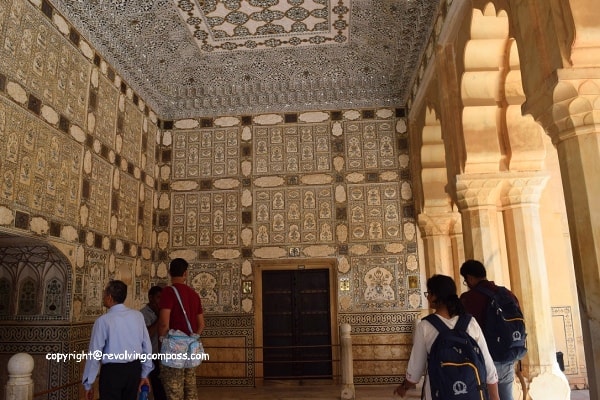
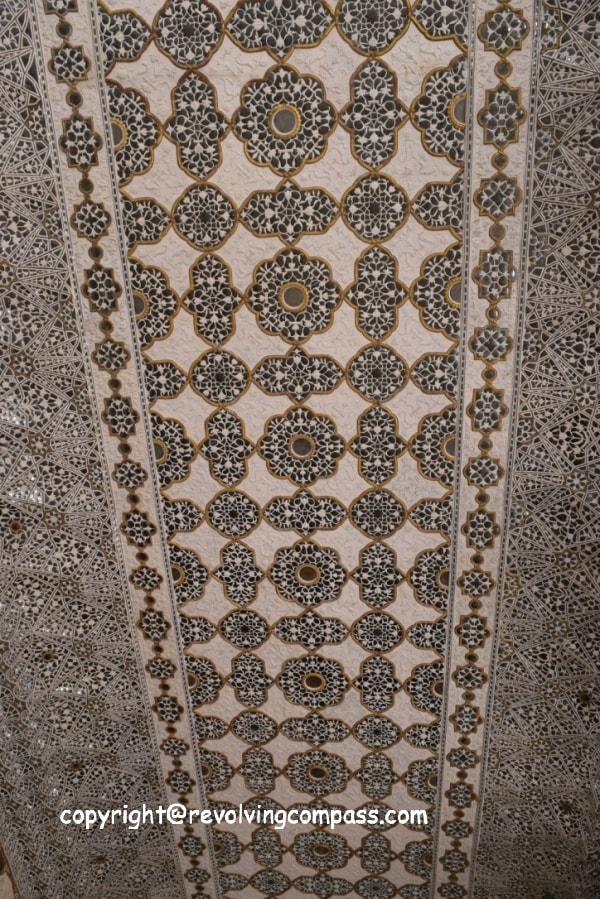
7) Magic flower
Magic flower is one of the most noteworthy creations here. While this looks like just any other design engraved at one of the tiles at a pillar of Jai-Mandir. However, this flower has a depiction of 7 different elements in one single flower. As and when you cover the different parts of flower using both your hands, the exposed area reveals a new element. It includes the depiction of a fish tail, a lotus, a hooded cobra, trunk of an elephant, tail of a lion, a scorpion and a cob of corn. There must have been some significance to it, which, unfortunately our guide was not aware of. In conclusion, its one of those masterpieces of ancient art you often come across while visiting these palaces and forts.
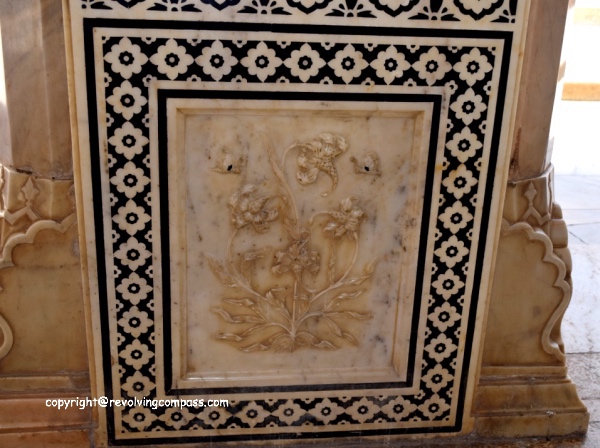
8) Kesar Kyari
From Sheesh Mahal, we headed towards another flight of stairs to reach the section of the palace where the royal ladies resided. En-route, we caught a glimpse of this beautiful garden called Kesar Kyari (Saffron Garden). It was the royal garden at Amer fort, where saffron cultivation was done. The garden is located on the banks of Maota lake, the same lake we encountered at the entrance of the Amer fort and across which we had our first glimpse of the fort .
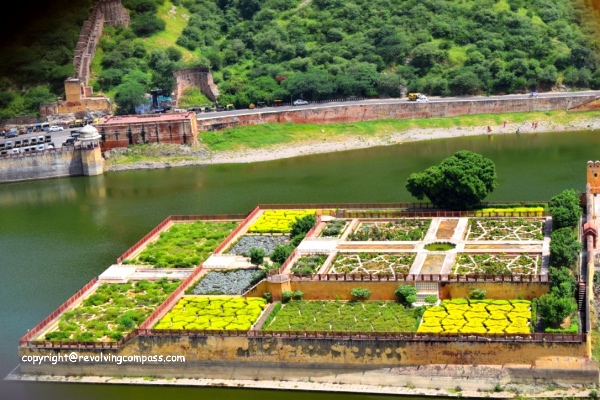
9) Baradari and Janana Mahal
At the top of the flight of stairs, we entered into the part of palace where the royal ladies resided. It is ‘Janana Mahal’ meaning the palace of the ladies. There is a baradari (small courtyard) in the middle of this part of this palace . Baradari has several rooms on all its sides. This is the place where the sword fighting scene of Jodha Akbar movie between Aishwarya and Hrithik was filmed. The queens used to meet here with each other.
The king had 12 wives , and thus, one can see 12 rooms on all sides of Baradari (3 on each side). It’s believed each queen belonged to a different zodiac and the king married them for auspicious results. There is one quarter belonging to each queen where she resided in privacy, with her housemaids and close friends.
And, interestingly, the queen’s bedroom in each of these quarters are connected to the king’s bedroom via an exclusive private passage. Probably, this whole arrangement ensured that whenever the king visited one of the queens, there was no way for the others to know. Thus,it avoided jealousy and rivalry between the women who were sharing a husband!. Because no one could know whom was the king visiting . So much arrangement to maintain 12 wives. (Looks like further generations took their lessons, the next king had only 3 wives and the last one had only 1).
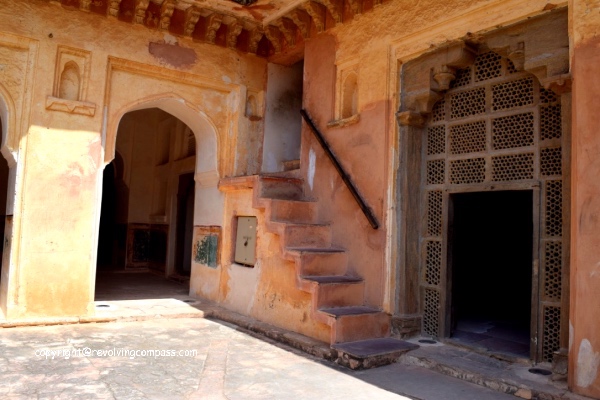
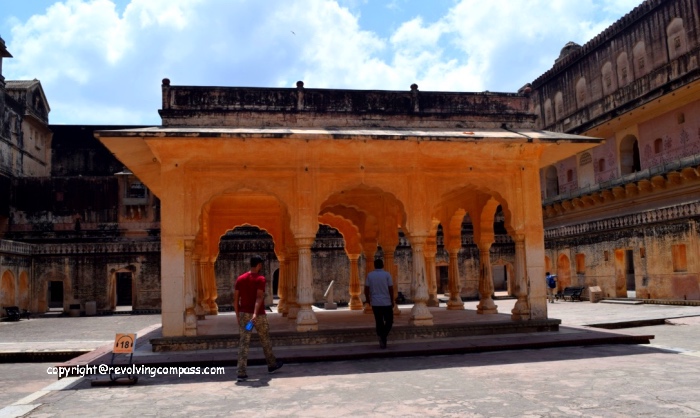
10) Exit and refreshment
From here, we took an exit route to emerge back into the entrance courtyard. Just before the exit, we encountered the big vessel that was installed for the movie Jodha Akbar
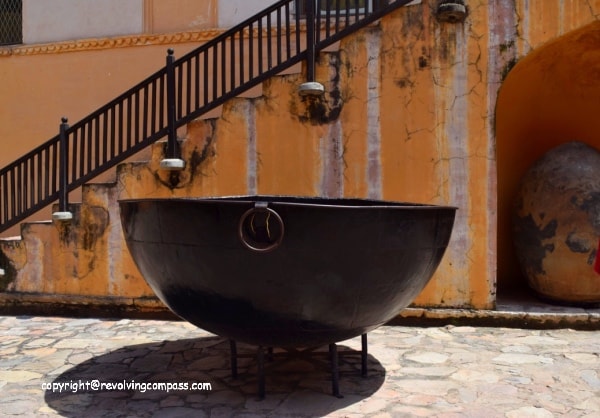
Along the way, you will find neat and clean restrooms, some vendors selling oxidized silver earrings (at dirt cheap prices) and a puppet show going on – quiet a lively section to end Amer fort visit. Upon crossing all these, we exited the grand fort. Although, we were quiet exhausted by now through a 2+ hours walk across the fort in the afternoon heat. However, we bought some bottles of juice and water here, before heading off to our next destination, Nahargarh fort. We didn’t have our food here because the options were limited.
For a comfortable visit to Amer fort
How to visit, when to visit
- Try visiting in the early morning hours, as soon as the fort opens to public (around 9 am). Subsequently, you will be able to offer your prayers and step inside the Sila Devi temple.
- You can take a bus also to Amer from Jaipur, although a taxi would be more comfortable given the heat during the daytime.
- And you can buy your tickets either at the fort entrance, or, you can buy a combined ticket with other Jaipur monuments and palaces at Hawa Mahal, whose validity is for 2 days.
- Most of the information about the fort timing, ticket etc. can be found here.
- Take a guide who is certified to take you across and do your homework before visiting the fort so that you see and hear the correct facts.
- Also, there is an Anokhi hand printing museum very near to the fort, which is closed on Mondays. We visited on a Monday, so, couldn’t pay a visit here. Sounded interesting to me, would have loved to go there.
- And there is a light and sound show conducted in the evening, so, if interested, time your visit accordingly, post noon.
- If you arrive here in the morning, there is an option to ride an elephant from the foothill till the fort entrance. This is available till 12 pm. However, I would refrain from availing this option , I don’t want to harass the poor creature.
- Also, you can visit some government emporiums or shops on your way back. There is no compulsion to buy anything. You can checkout the products. For these shops, looks like footfall counts. On our way back, we were demonstrated authentic hand block printing at one of the shops which was interesting to learn.
What to wear, what to carry
- Wear comfortable cotton dresses. We tend to wear sleeveless or half sleeve dresses at hot destination. Do it only if you want to have a good dose of tanning because most of the time you would be wandering around open courtyards and gardens under the blazing sun.
- And take some water and canned juice with you, particularly if you are traveling with toddlers. You will tend to sweat a lot, and there is hardly any provision of water inside the palace, until you come out to the refreshment area.
- Also carry some snacks with you for quick byte. Once we were out of Amer fort, we wanted to have lunch, but didn’t see any fulfilling options until we reached the next destination – Nahargarh fort. As a result, we had a late lunch at Nahargarh food court. Will soon write about it. There are some fast food outlets at Amer fort premises and some small hotels nearby.
- As long as you enter via the Suraj Pol, and exit from near the vessel (as we did), you will find a pay and use restroom service that is OK enough in case you need to pay a visit.
Toddler friendly tips
This one is exclusively for those who travel with babies and toddlers.
- You must have a hat for them.
- Also carry their water bottle and snacks along and keep offering them the water bottle at regular intervals so they keep hydrated.
- And you can buy them a can of juice also from which they can sip through a straw.
- Towards the exit, use the restroom for them if yours is toilet training. (Ours is actually!).
- Make them wear comfortable cotton cloths and comfortable sandles or shoes.
- And cover their hands and legs (Use long sleeves and full length trousers ) so they don’t tan.
PS: We had read wikipedia and several blog posts, before visiting Amer fort. Subsequently, it helped increase both our knowledge and eagerness to visit this place further. In particular, we liked this post by Ami Bhat, reading which we almost felt we were visiting the fort along with her.
PS: Some of our links are affiliated, this means we will earn a commission when you buy a service or product by clicking those links. However, this will have no extra cost for you.
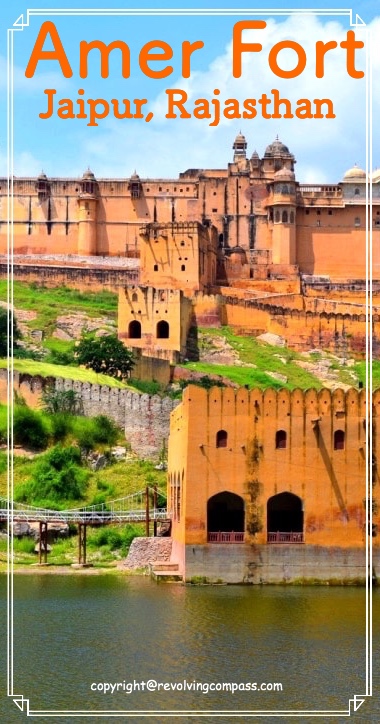
This looks incredible! I always love finding out more about places and the history. Great photography and great tips in the end too!
Thanks Kreete
I am amazed at how intricate the design of the ceiling is. I can only imagine the painstainking process of doing that. I have read many articles already about Fort Amer and I can understand why it is suddenly famous to the tourists. It looks beautiful.
You are right Merge. It is very beautiful and has some fascinating structures
I love to garden and I would like to cultivate saffron at a place like this. But everything look so nice, I would like to visit Amer fort as soon as possible.
I love visiting forts! Aside from the stunning architectural details, I love that they have a lot of history! This one seems no different.
you are so right
This is such an interesting place you’ve visit, I love how you talked about the history, I’m such a nerd so I digged that!, also the pictures are beyond beautiful!
Thank you so much
I like reading your articles because you talk about history of the places that you have visited. I like the story about Janana Mahal. There should palace for the ladies in all countries. = ) The interiors look amazing and so intricate. I wonder how did they do it in earlier times. It must have taken them such a long time but it paid off.
Thanks Iza..and about the architecture…I also wonder exactly about the same. In this era of machines, we are still not able to produce such kind of work. How did they do it then!!
Great post and really detailed. I haven’t been in India yet, but will save all your tips for later on.
Thanks Nadine
Wonderful photos and Amer is such a quintessential fort to visit especially for those of us who grew up in Delhi. I’ve been there as a kid but what I really liked now was that it’s maintained much better than before. No visit to Jaipur is complete without a visit to Amer
So rightly said. Even I visited as a kid here. And now visited with my kid..and felt the same enthu 🙂
OH, what wonderful colors!! I love to garden and am drawn to beautiful gardens like the one where saffron is cultivated. It looks like a quilt with designs of different greens from the plants. One day I hope to have a large enough spot to create such a canvas with plants!
Alas saffron is no longer cultivated here.. nevertheless the garden looks amazing
your pictures are gorgeaous and I really enjoyed reading your post. keep the good work up 🙂
Thanks a lot
Thank you for sharing such a detailed post, I like the last section listing ways to make the visit more comfortable. It was advice for many things we often overlook and that make such a difference to our visits or traveling
Thanks Chanelle!!
The buildings and design are so gorgeous! I’d love to visit some day.
Amer fort is another fascinating marvel of Rajasthan. I especially loved the Saffron garden, it looks so lovely. Love forts, they have such a mystical aura about them.
Yes, the saffron garden is beautifully maintained. Only no more saffrons are cultivated here 😛 But there are so many wonderfully architected nooks and corners in this fort that it doesn’t stop to mesmerize me. Like the natural AC
Neha, I would love to visit the Amer Fort. I love history and this fort has a lot of stories to tell. You’ve filled in all the possible points one needs to know about it. Great post!
Thanks Johann. I will be waiting to hear about your experience after you visit here. Hope you enjoy your trip as much as we did
History is so dark, I am horrified at the face that humans were sacrificed in this beautiful place. Glad it’s not happening anymore! This is such a wonderful post, thanks for sharing the tips and tricks, pretty sure it’ll come in handy as I plan to visit this place.
Completely agree with you. The ancient times were luxurious but equally barbaric in some of the practices..
Love the architecture of the place! And nice to have some tips when you are travelling with kids 🙂
Thanks Alessandra
Thanks for this great information. It is so detailed and organised. It is so helpful to anyone planning a visit to Amer fort.
Thank you, glad that you found it useful
The more I read about India the more fascinated I become. The intricate details in the buildings at just amazing. I also think of the countryside as dry and brown but your photos have such verdant greens. It’s amazing!
Even my mom thought Rajasthan in particular is all desert..sand and brown and dry. And her conception totally changed after this particular trip
For such a small town, Amer seems like it has a lot to offer! I would love to visit the Amer fort! The incredible amount of detailing in the walls would be amazing to see up close! That’s also very interesting that the King had a wife for each Zodiac sign! It’s so interesting to see certain aspects of history that are so globalized!! Thanks for sharing! I can’t wait to read more about your adventures in Rajasthan!
Thank you! the stories were indeed very interesting. It would have been like visiting some hollow structure without knowing the history and the stories. It’s like, when you are there and the guides narrate the stories, you can visualize the place alive with the king, queen and their hundreds of folks inside the palace. How wonderful it would have been then! You can actually visualize the graduer